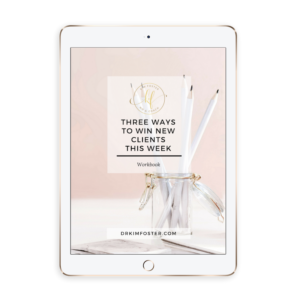
So let’s say there’s an investment you want to make in your business. Maybe it’s hiring a website designer, a branding photographer, a mentorship program, or funding an ad campaign. Whatever it is, the output is going to be a good chunk of money … but you’re confident the return on that investment is going to make it completely worthwhile.
Only problem? You need to talk to your spouse about it first … and you’re not sure he’s going to be on board.
This comes up for so many entrepreneurs! Many of you legitimately need to talk to your partner first before making a big investment in your business — especially in the early-ish stages of your business. If it affects your household, it’s something you’ll need to discuss with your partner, and I totally get that. But this is NOT always an easy conversation to have. Believe me. I have had to tackle this issue in my own marriage, talking to my husband about investing in my business in the early days…and wow, it was not easy.
So this is what we’re going to talk about today. How to have this conversation.
By the way, if you’d rather listen than read, here’s where you can tune in to this episode:
Over the years I have conducted a lot of discovery calls and sales calls, conversations with women who are interested in working with me, are really keen to build their coaching businesses, and are pretty excited to get some next-level support and help with that…but what comes up for them, so often, is the fact that they need to talk to their husbands first, before making the commitment and making the investment.
I’ve also been to many conferences and workshops over the years, and sometimes there’s a workshop on sales … during which the speaker tends to label this as “an objection”. The “spouse objection”.
I really dislike that. I think it minimizes the legitimate issue, the potentially thorny issue of talking to your partner about money you want to spend on something, and it just kind of dismisses a person as having a “sales objection” when they say they need to talk it over with their partner first. Like there’s something wrong with them for saying that, or they’re being weak or throwing up excuses. Because that’s really not fair.
Now, granted, some people do use the phrase “I have to talk to my partner first” as a way of ending the conversation, and kind of getting off the phone or whatever. It’s true, that does happen. I’ve done that myself in certain situations, like when someone comes to the door wanting to sell me fertilizer or clean out our eavestroughs or whatever and I make some lame statement about needing to talk to my husband, just so that I can close the door and get on with my evening.
So I guess there are two categories here — people who claim to want to talk it over with their partner as a way of ending the conversation, or people who legitimately do need to do this before making an investment decision.
And I want to speak to the 2nd group today. This is for those of you who truly do need to have this talk with your partner.
Now, it’s not just about working with a business coach, like me, or joining a program, like my group Business Academy for Coaches. It could be investing money in a professional website designer. Or investing money in an ad campaign. Or traveling to a conference.
A while ago I wanted to go to a very fancy, very important, and very expensive business conference in New York City. Now, this was more than just going for my business, because I also wanted my husband and boys to come along, and for us to make a family trip out of it, in addition to me attending this event.
I knew my husband would not go for it. He is very cautious with money. He learned this from his family. His mom was very practical, she was the youngest of 10 kids, and she grew up on a farm, and also lived through the war, so being frugal was everything. I have had to do a LOT of work on my husband to help him loosen up the purse strings over the years, and to view money as a renewable resource and not something to be hoarded and saved under all circumstances. And he has coem a long way, for sure. But when I knew I wanted to go to this fancy New York event, I knew I had my work cut out for me.
So I made a plan, and I made a power point presentation. That’s right. I made a slide deck.
Now, I didn’t have to do this. It wasn’t really about getting permission. It was more about getting buy-in. It was about helping him to see how awesome this investment could be, and helping him feel really good about it.
Anyway, I made my presentation one evening, after the boys were in bed. And he was, as I expected, SUPER reluctant when I first floated the idea.
And then, after listening to everything I had to say, and watching my funny little presentation…he was totally on board. We all went to New York, several months later, I attended the event which was just as awesome as I’d expected, and we all got to enjoy a fantastic family trip in the city, staying right in Times Square and doing all the amazing things Manhattan has to offer.
And the investment in my business has returned to me many times over since then.
So let’s talk about how you can accomplish this kind of thing yourself. If you have an investment you really want to make in your coaching business, to grow your business — and maybe it’s not right now, but you WILL, you definitely will, down the road, because that’s just what’s required when you’re growing a business, if you want ti to be successful.
So here are my 9 DOs and DON’Ts.
#1: DO be clear & confident in your own mind before you approach your partner.
If you go to your husband all uncertain and full of confusion and with questions in your mind, he will definitely sense that and basically he’ll look to protect you. He’ll say “no, honey, don’t do it! It doesn’t sound like a good idea.”
So before you talk to your husband, you’ve got to be clear in your own mind that this is something you need to do for your business. That’s the first thing.
But as long as this is actually true for you, that you are clear that this is something you need and want…
Be confident and approach this conversation with a clear vision. If you don’t have a clear vision for how this investment will help to create the future success of your business, you won’t be able to convey that to him. If you start this conversation from a standpoint of uncertainty or hesitation, like I say, he will sense that and seek to protect you, and recommend that you “wait” or “say no for now”.
#2: DO consider this from his perspective.
Men are interesting. I don’t know your husband, obviously, but I know that men tend to be very practical, especially when it comes to money, and they like things that are concrete. So you have to explain this investment in a way that helps that side of him really grasp things.
Because of course, unless he’s in this industry, he doesn’t know what it’s all about. You’re in it, every day, you know what you need and what you’re seeing, and what other people are doing, and you’ve been listening to this podcast and probably following other coaches and mentors and so you know all this stuff…but he doesn’t. ALL he can see is the $4000 sticker price, or whatever it is, and so of course he won’t understand why you need to invest that amount, unless you explain it to him and help him see why it’s so important.
Unless he’s an entrepreneur himself, he probably won’t have a clear understanding of the coaching industry, or what it takes to build an online business. And the whole idea can seem very risky and vague! Especially if his own income comes from a bi-weekly salary or paycheque, the idea of investing in your business before that business makes any money will be very foreign and may even sound crazy, so it’s your job to help him understand the situation.
#3: DON’T approach your partner with a request for “permission”.
Approaching this conversation as though you’re asking “permission” is not an energy or a power dynamic that I have found to be helpful, and it does not set a good precedent. It will not serve you well in your relationship or your business going forward — and the truth is, there will be other investment decisions to be made down the road as you reach new levels. Remember that you are the CEO of your business, and what you’re looking for is support and buy-in from your partner, not permission.
#4: DO be the CEO of your business.
Don’t shy away from this conversation — this is actually a skill you’re going to need in your own business anyway, as a coach and as a CEO, and this is your first assignment! Stand strong in your truth and your belief in yourself, and present this opportunity in a way that will help your partner truly see the value and the potential.
#5: DO position this investment as exactly that — an investment.
The key thing is to help him see this program as an investment in the future of your business, and your life as a couple and a family.
Although men want to support their partners, it’s normal for them to be a bit unsure about what you’re doing. He may be thinking: maybe she can wait until next year to do this program when she is making a bit more money. But unfortunately this is flawed logic when it comes to building a business and investing in that business. You can tell him that unless you receive guidance on HOW to make more money, you will be in the exact same situation this time next year. All you’re doing is delaying the time you get started. Instead of waiting 12 months and then getting started, you could be 12 months’ further ahead by starting now.
#6: DO focus on showing your partner the benefits and the outcome.
It’s crucial that your partner see and feel the outcome and the benefits of joining the program you want to join and making this investment. If it’s a business-building program or a business coach or something like that, focus on the idea that it’s important to learn from somebody who has gone before you and has had proven results.
You could say something like this:
“I want to learn what’s working now, stay in the know, and learn the cutting-edge strategies versus wasting time guessing on what I should or shouldn’t do. I want a fast track to success, I want to focus on hitting my big goals this year, and I believe this program is going to help me get there.”
Another helpful script:
“I’ll be getting some real skills and lessons to immediately improve the performance of my business. This expertise and program will help me step up, get started, and make money quickly. For me to build a business, we both have to treat it as a business and decide as a couple to invest in me as the CEO.”
#7: DON’T get caught up trying to describe features of the program.
Don’t go into the features of the program (eg. there are 13 modules, there are video tutorials and workbooks in each module, and then we have a weekly call, plus a Facebook community…). Don’t get into all that because it’s not a productive way to conduct this conversation. That typically causes a lot of confusion with unnecessary detail. Most likely your partner just wants to know what the outcome will be.
#8: DO try to find comparisons that will be meaningful for your partner.
Sports analogies can be effective! Or executive coaching, perhaps. Depending on your husband’s interests and tendencies, many men have an easier time with those analogies. You could explain that you’d never try to learn a new sport without investing in a program, club, or coach.
Or perhaps comparing to the cost of other similar retraining programs, if you were seeking to move into another career: the cost of a university education, a college degree, a diploma in a trade or vocation, for example. How much do those things cost? Typically, many times the cost of this program. Most university graduates leave school with a debt of over $100K, and still don’t necessarily have the tools they need to actually make money. Contrast this to what you’ll be learning with this program — which is all about giving you tools, strategies, and a framework for earning a great income in your business.
#9: DO go into detail about the potential return on investment.
As I’ve said, your partner simply wants to know: what is the outcome of this going to be? What return on investment can we expect?
Now, you can’t make guarantees, of course, but you can focus on what’s possible. I have had clients earn back their investment within the first few weeks of working with me — with a single sale! I have had clients double their rates — and their monthly income, and keep climbing from there. I have had many clients go from having NO clients themselves, to having clients enroll in their packages every single month. My clients and students report that this would never have been possible without my guidance, expertise, and support.
RECAP
Okay, so there you have it, my 9 pointers to help you have a successful conversation with your partner about investing in your business.
Here they are again:
- DO: Be clear & confident in your own mind before you approach your partner.
- DO: Consider this from his perspective.
- DON’T: Approach your partner with a request for “permission”.
- DO: Be the CEO of your business.
- DO: Position this investment as exactly that — an investment.
- DO: Focus on showing your partner the benefits and the outcome.
- DON’T: Get caught up trying to describe features of the program.
- DO: Try to find comparisons that will be meaningful for your partner.
- DO: Go into detail about the potential return on investment.
I hope this gave you some ideas for how to approach this conversation and instead of it being very awkward and uncomfortable (and ending with one of you angry or in tears) … ending in mutual agreement and excitement for the possibilities.
Are you ready to build your coaching business, get a framework for enrolling consistent monthly clients, and finally achieve the success you desire?
My flagship group program, Business Academy for Coaches, is now open for enrollment!
Head over here to read about all the details, and either enroll or book a call to chat with me personally about whether this program is a good fit for you.
Resources & Links:
- Business Academy for Coaches
- Health Coach Squad (my free Facebook Group)
- The best platform for your coaching practice: Practice Better
- The landing page program I recommend: Leadpages
- The email marketing system I recommend: ConvertKit
- 3 Ways To Get New Clients (my free guide): drkimfoster.com/getnewclients
N.B. some links are affiliate links.
3 Ways To Win New Clients This Week

Subscribe Links:






